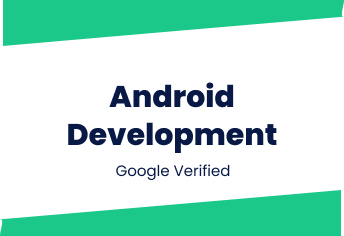Android Certification training by Dean institute is now certified by Google. Google plans to train 2M android developers in India in next 3 years as the app ecosystem grows stronger with advances i...
 Engr. Sujoy
Engr. Sujoy
Android Certification training by Dean institute is now certified by Google. Google plans to train 2M android developers in India in next 3 years as the app ecosystem grows stronger with advances in IOT, mobile devices and has chosen Dean institute as one of the partners to realize this goal with its Android training course.
Learning Objectives : In this module, you will learn to create a user interface by using the visual tools and the underlying XML. We will deep dive into core of Android layouts and impressive and easy to code android widgets along with Implementing Event Receivers.
Topics : Basics of Android, Android Architecture, Android Studio Setup - Modifying project parameters in Android Studio and Gradle build files, Adding dependencies in Android Studio and Gradle build files,DDMS, Activity Lifecycle, Event Listener LinearLayout, RelativeLayout - Adding a widget to the user's home screen and updating active home screen widgets, FrameLayout, TableLayout, WebView, CheckBox , RadioButtons, Spinner, AutoCompleteTextView, CardView, TimePicker, DatePicker Dialog, BroadcastReceivers (System & Custom), LocalBroadcastManager
Learning Objectives :In this module you will learn to implement different collections widgets available in android like GridView, ListView and RecyclerView. We will also learn to implement one of the four essential components of Android development, which is Broadcast Receivers. We will also deep divining into Android canvas framework, which lets you draw different shapes on the screen.
Topics : GridView, ListView - Building layouts using XML and Java code and Grouping common UI design elements with styles, RecyclerView - Handling item touch interactions in a RecyclerView, DrawerLayout - Providing alternative resources for device configuration changes, Canvas & Paint - Customizing the application theme, Extending framework UI components to create custom views and validating application layouts properly respond to accessibility events, Constructing Option menus for action bar navigation
Topic 1 : Storage, Media and Animations
Learning Objectives : In this module you will learn most important persistent frameworks in Android system, which is SharedPreference, and Android File System. We will learn to implement different types of animations provided by android system to create impressive android applications.
Topics : Internal & External File Storage, haredPreference - Creating settings UI using the preferences framework and reacting to changes in a Shared Preferences instance, MediaPlayer & VideoView, Tween Animation, View Property Animation, FrameAnimation
Topic 2 : WebServices
Learning Objectives: In this Android Certification module, at times you will need to perform tasks that should prevent blocking the user from performing other tasks in the application. Here is when services and broadcast receivers come into play. You will learn the highly acclaimed API of Android framework, which is AsyncTask. We will also learn to implement SOAP Services. You will understand the concept of Retrofit library used for performing these Asynchronous tasks.
Topics : An overview of SAS, Application of SAS, SAS Environment, Interface, Componnents, SAS Libraries, Programs, Data Step, Proc Step, Key Concepts - Data Set, Descriptor, Portion, Data Portion, Observation, Variables etc.
Topic 3 : Location and Google Map
Learning Objectives : In this module you will learn android location framework like GoogleMaps and Geocoder, which will help you to integrate location related functionality in your applications. You would also learn to draw markers on the map to show targeted locations to user and also perform animated zooming over the map.
Topics : Fetch Users Current Location, Reverse Geocoding using Geocoder, MapFragment, Showing Current Location on Map, Showing Markers on Map, Exploring different Map Types Animated Zooming using Camera
Topic 1 : Database Framework and Third Party Libraries
Learning Objectives : In today's world what app doesn't make use of saving and retrieving data? You will be learning most common mechanisms for doing this. You will learn to use android SQLite framework. Also you will see how the data can be saved in database asynchronously. After completing database we will learn how to use few of the most famous and efficient third party libraries in our application like image loading, database implementation while writing minimal code.
Topics : Using SQLiteOpenHelper - Accessing static bundled data in assets (e.g. premade databases, config files), SQLite Data Types, Maping between Table & Widgets using CursorAdapters, Async CursorLoader , Palette for extracting colors from images, Picasso for Image Loading & Caching, ButterKnife for Injecting Views, TimesSquare for showing CalendarView, Cupboard for ORM
Topic 2 :Localization, Sensors and Social Media Integration
Learning Objectives : Facebook, DropBox & Google Drive are some of the essential applications which are present on almost all user devices, we will learn to integrate them in our application. We will be learning Single Sign on, uploading files to Google Drive. We will also learn how to target international audience using localization and various sensors available in Android devices like compass, Accelerometer etc.
Topics : Localization, Facebook Integration, Dropbox Integration, Google Drive Integration, Exploring Android Sensors
Topic 3 :End-to-End App Development & Publishing
Learning Objectives : In this final lesson, you will learn to use Android Studio much more efficiently; we will create one live application end to end to revise the concepts we learnt earlier. We will be signing the application using our newly generated keystore and then you will learn how to submit an application to Google Play to share with the world.
Topics : Debugging Applications, End to End App Development including writing and executing automated unit tests on the local JVM, writing and executing automated instrumentation tests on an Android device, using the system log output (andlogcattools) to trace code execution, locating an error from the stack trace of an uncaught exception and using Strict Mode to locate and report threading violations and leaks, Using Proguard to obfuscate applications, Generating Signing Keys, Publish the application on Google Play Store (Live Demo), Doubts & QueriesUsing Proguard to obfuscate applications
Yes, dean institute is a google certified training partner and the content is as prescribed by Google. Find out more - https://developers.google.com/training/programs/india
Yes. We are completely aligned with Googles course curriculum requirements. The complete curriculum has been vetted by Google before awarding Dean Institutete the Authorized Training badge.
We prepare you for Googles certification exam, post the completion of the course however you need to appear for the Associate Android Developer Certification conducted by Google, upon successfully taking the exam you would be eligible for the certification. We would however ensure from a training perspective you are completely aligned and prepared for the exam
For your practical work, we will help you set-up the Java environment on your system along with Android Studio. This will be a local access for you. The detailed step by step installation guides will be present in your LMS which will help you to install and set-up the environment. The support team will help you through the process.
As soon as you enroll to the course, your LMS (The Learning Management System) Access will be Functional. You will immediately get access to our course content in the form of a complete set of previous class recordings, PPTs, PDFs, assignments and access to our 24x7-support team. You can start learning right away.
Yes, to work on Android on your Windows, the simplest way is to install Java Development Kit (JDK) & Android Studio on your Windows Machine. Then follow the steps as mentioned in the installation guide provide in the LMS and start working on the Android assignments.


Enrolled

Hours Required
32 Hours
0 video
Quizzes
Certificate
| February 6th | Sat & Sun (5 Weeks) | Time-09:00 am to 11:30 am |
| Dec 28th | Sat & Sun (5 Weeks) | Time-09:00am to 011:30am |

